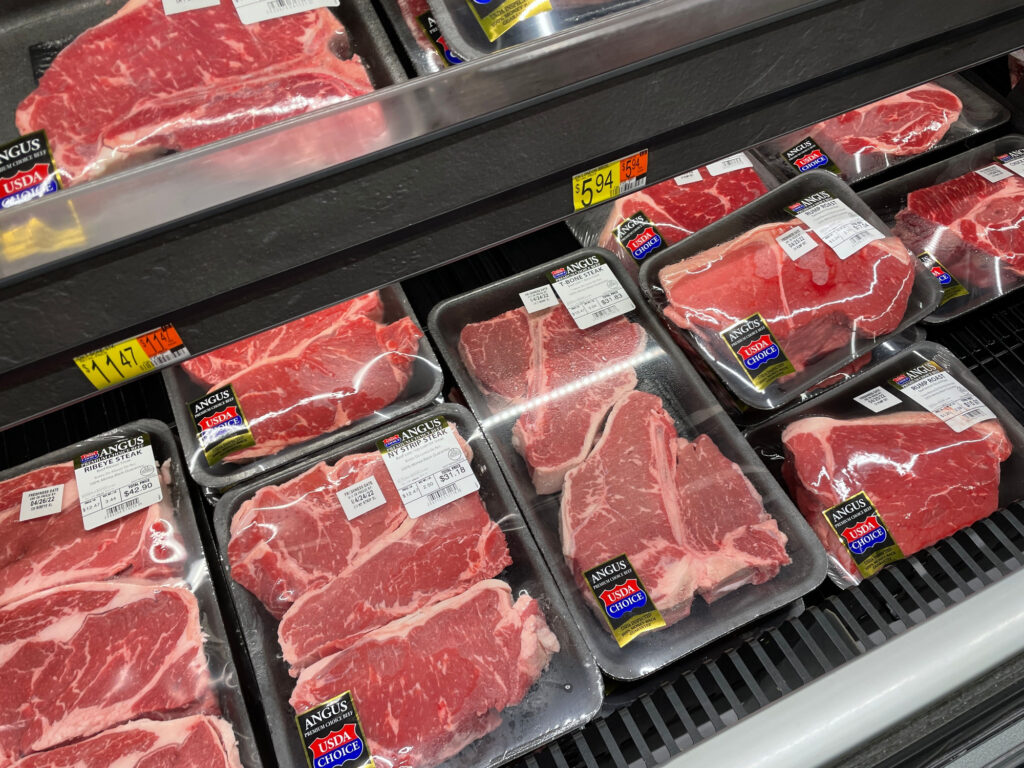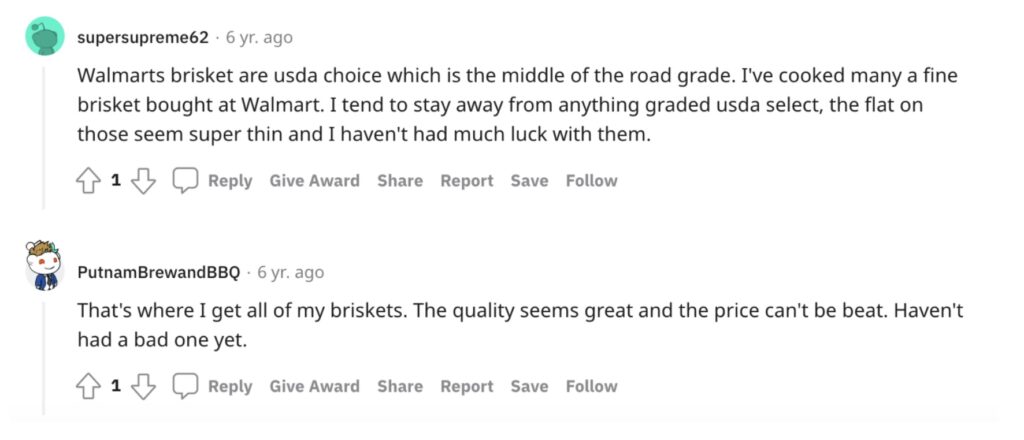As one of the largest retail suppliers of meat in the country, Walmart has a lot of customers wondering where exactly their meat comes from.
In recent years, the retail giant has become a target of increasing scrutiny as consumers grow more discerning about their health and food sourcing. Walmart’s consumer base has requested transparency in Walmart’s meat supply chain, and the company has made several attempts recently to answer that call.
Contents
Walmart’s Meat Supply In 2023
Walmart’s meat supply practices are changing. While the company relied for many years on third-party suppliers to produce and process their meat, Walmart has recently stepped into the ring as a player in the meat production industry.
First in 2021, Walmart gained publicity after it launched McClaren Farms, an original brand sourcing Angus beef from a Texas rancher named Bob McClaren. However, McClaren Farms beef makes up for just a small percentage of the beef sold in Walmart stores. According to the latest available information, McClaren Farms beef is only available in Alabama, Florida, Georgia, Mississippi, and South Carolina.
Back in 2018, Walmart made a similar move by partnering with a collective of family-owned ranching operations in Utah and Wyoming to produce a line of grass-fed beef for Walmart’s changing consumer base. Beef produced by the Crandall family and sold by Walmart is available widely in Walmart stores across the country and on Walmart.com.
Just one year after partnering with McClaren, Walmart invested in a company called Sustainable Beef LLC, a rancher-owned company based in Nebraska specializing in bringing sustainable, high-quality beef into the supply chain. However, the company is still in the process of building their first meat processing plant, which isn’t expected to open until 2024.
According to a 2020 article from TheCounter.com, the majority of Walmart’s meat still comes from Tyson and Cargill–two of the largest industrial meat producers in the world. But if the plans Walmart is laying now pan out over the next several years, more and more of the meat on their store shelves will come from their privately owned farms throughout the midwest and Rocky Mountain regions.
Part of Walmart’s new shift toward investing in the beef industry at the ground level is motivated by their desire to sell meat that isn’t simply relabeled from another supplier. In 2020, Walmart purchased its first ever meat packing plant, located in Georgia, which is being seen as a move toward selling meat products that have been produced, processed, and packaged specifically for Walmart consumers.
The meat offerings available at Walmart that aren’t sold under a store brand come from companies like Hillshire Farms, Johnsonville, Tyson, and Oscar Meyer.
Despite relying on a wide range of producers and suppliers, Walmart sources all of its meat from North America. And contrary to some recent online rumors, Walmart does not sell meat produced in China.
Types Of Meat Available At Walmart
Walmart sells the following kinds of meat:
- Steak
- Ground beef
- Corned beef
- Chicken
- Sausage
- Pork chops
- Ham
- Spam
- Bacon
- Stew beef
- Hot dogs
- Burgers
- Lunch meat
- Meat sticks
Walmart does not sell many specialty meats. For example, I live in the Seattle area, and none of the Walmarts near me sell lamb, veal, or halal meat.
Walmart’s meat prices range from $1.18 for a package of lunch meat to $29.67 for a whole spiral-cut ham.
How Often Is Meat Stocked At Walmart?
Theoretically, Walmart restocks their meat and other perishable grocery items on a daily basis. Walmart employs stockers who work around the clock, so these products could be restocked at any time of the day or night.
Always pay attention to the sell-by and expiration dates on your meat products before purchasing.
Walmart’s Meat Quality
Walmart sells a wide range of meats, varying in quality from just okay to fairly decent.
The highest-quality meats available at Walmart stores across the country are their USDA Prime ribeye and New York strip steaks. These steaks are currently priced between $15 and $20. The current average per pound price for prime steak at Walmart is $17.97.
Other reports have warned against buying meat at Walmart due to the fact that most of it is “case ready.” Case ready meat is meat that has been produced, processed, and packed by other companies before being sent to Walmart. At the end of the line, Walmart simply puts their own store-brand labels on the product and then places them on store shelves.
With this model, the meat you’re buying at Walmart is guaranteed to be sourced from one of four major US meat companies–Tyson, Cargill, JBS, or Marfrig. None of these major companies are particularly well known for producing high-quality meat.
All that said, these Reddit commenters seem super satisfied with the quality of Walmart’s meat:
Walmart’s Meat Pricing vs. Competitors
While the quality of Walmart’s meat is not necessarily the best of the best, they definitely guarantee low prices.
The most expensive meat item I could find on Walmart.com is a whole ham for about $30. This is very cheap considering that meat prices can often reach up to as high as $100 or more.
As a side note, Sam’s Club meat doesn’t necessarily come from the same suppliers as Walmart meat, even though Walmart owns Sam’s Club. According to several sources, meat prices are consistently lower at Sam’s Club for meat of a similar quality as what’s sold at Walmart.
FAQs
What is the highest grade of meat in the United States?
Prime. Prime is the highest USDA meat grade and is usually only applied to steaks of a certain cut and quality. According to RedMeatLover.com, prime beef “has the most intramuscular fat which makes it tender and juicy, and gives it a rich, beefy flavor.” Prime beef makes up just 5% of the meat sold in the US each year.
Where does the grass-fed meat at Walmart stores come from?
Utah and Wyoming. Walmart sells grass-fed beef under the label Marketside Butcher, which is a Walmart-owned brand. The meat that’s sold under this label is raised by two large cattle-ranching families based in Utah and Wyoming.
Is Walmart meat USDA-approved?
Yes. All meat sold commercially in the US is required to be approved by the USDA according to federal meat inspection standards.
Is it better to buy meat from a butcher or supermarket?
Although it tends to be more expensive, the best way to buy meat is from a local butcher who sources meat from local, small-scale producers who use ethical and organic farming practices.
Better yet, some consumers have even taken to buying meat directly from farmers, which is a great way to support your neighbors and get access to the freshest meat possible. When looking at factors like meat quality (flavor, texture, freshness), overall carbon footprint, dietary and health factors, as well as ethical considerations, buying meat from the supermarket lags in every single category. Of course, it’s possible to buy local, organic meat at the grocery store, too, but you have to look closely at where you shop and the products you choose to buy.








